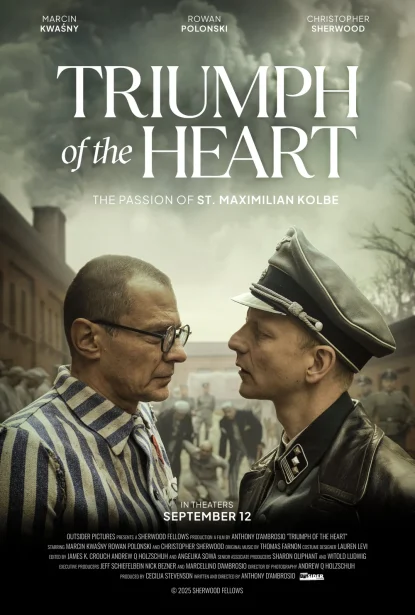 In the dark hours of the night, battling chronic insomnia and losing his faith in God, film director Anthony DiAmbrosio discovered a quiet “rebellion of hope” in the life of St. Maximilian Kolbe.
In the dark hours of the night, battling chronic insomnia and losing his faith in God, film director Anthony DiAmbrosio discovered a quiet “rebellion of hope” in the life of St. Maximilian Kolbe.
Tasked with a freelance writing assignment on the biography of the saint who died in a starvation bunker at Auschwitz in 1941, DiAmbrosio found himself facing “a starvation of sleep, in the middle of the night alone, no one was up and there was no one to talk to,” he recalled.
He had lost his faith, his career, and his girlfriend, and wondered about the point of living. But he was inspired by the final days and hours of St. Maximilian’s life, as he pondered the “miracle of hope” that the Franciscan priest brought to the darkest prison cell as he sang songs and prayed with men undergoing an agonizing death by starvation.
“For me it felt like (Kolbe) was entering into my suffering the way the way he entered into the suffering of these other men descending into their hell … and ultimately into mine, to help lead me, take me by the hand and lead me to God, to teach me how to carry my cross,” DiAmbrosio said. “He was an image for me of a beautiful father, of what the priesthood is really about and an image to me in many ways of who Christ was for all of us.”
Though it would take months before he received a diagnosis that would improve his health, DiAmbrosio vowed to bring the life and final days of St. Maximilian Kolbe to the screen, which has resulted in the film “Triumph of the Heart” debuting across the country later this month.
During World War II, German Nazis persecuted Jews, Polish intellectuals and Catholic priests for extermination by sending them to death camps or inflicting terrible punishments.
Before any of the modern-day media evangelists, Father Kolbe was inventive in his use of radio and magazine publications to spread the Gospel throughout the world. He was offered German citizenship during the Nazi takeover of Poland since his father was German born, but he refused and continued publishing the Gospel message throughout Poland. He was arrested and sent to Auschwitz in 1941.
When a prisoner escaped, the German authorities targeted 10 men to die as punishment. Father Kolbe, 47, volunteered to take the place of a married man. The chants and prayers of the men in the starvation bunker could be heard by many and was a source of inspiration amidst the evil where they found themselves.
At the end of two weeks only Father Kolbe and a few other men were left alive. They died by lethal injection on Aug. 14, 1941. It is estimated that more than 3,000 Catholic priests were killed or sent to Nazi concentration camps during the war.
“All these terrible places were filled with priests,” DiAmbrosio said. “I think (St.) Maximillan Kolbe is a sort of archetype of what these priests in these concentration camps were called to do. (That) was to be martyrs of love to minister to people around them, to the wide (and) diverse range of people who were present there.
“The stories that we have of (St.) Maximillan Kolbe and of many other priests in how they loved those people and brought hope to those dark places is incredibly heroic and really beautiful. I am glad to present that vision of the priesthood to the world, not just the Catholic Church. I think this is an undeniable example of heroism that really gives credibility to the priesthood as a whole.”
The production was filmed in Poland where all cast and crew members visited St. Maximillian’s prison cell. It is located next to the death wall of the camp, where prisoners were routinely rounded up and shot. Over the years several visiting popes have placed a candle inside the cell as a sign of the Christ’s resurrection and of hope.
A question DiAmbrosio asks is how do we react to the reality suffering? In Germany the people suffered humiliation, poverty and a crisis of identity after the loss of World War I. Their reaction was to place blame on other people and conquer other nations.
“Their reaction was this willpower, this Ubermensch philosophy that was very Nietzschean, this will to power and the casting off of all morality and love,” DiAmbrosio said, referring to the philosophy of Friedrich Nietzsche of an ideal person who transcends societal and moral conventions to create one’s own meaning and purpose without limitations.
“St. Maximilian Kolbe is totally the opposite,” DiAmbrosio said. “The whole story in many ways is what do we do with suffering, a place that God has seemingly completely abandoned. Kolbe’s story as well as the story of the cross help us to understand what to do with death, with suffering, with the feeling of God’s absence.”
To learn more about the film or to bring a screening to your area, go to TriumphoftheHeart.com.


Share this story